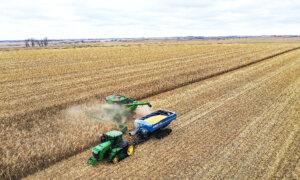The bill faces fierce opposition from House and Senate Democrats.
The draft text of the House Agriculture Committee’s long-awaited farm bill was unveiled on May 17, revealing a $1.5 trillion package that could set off another partisan fight in a historically contentious Congress.
“The Farm, Food, and National Security Act of 2024 is the product of extensive feedback from stakeholders and all Members of the House and is responsive to the needs of farm country through the incorporation of hundreds of bipartisan policies,” Rep. Glenn “G.T.” Thompson (R-Pa.) said in a statement.
Mr. Thompson, who chairs the Agriculture Committee, noted that the draft is “a significant step forward in a years-long, deliberative process” that shouldn’t be “compromised by misleading arguments, false narratives, or edicts from the Senate.”
Funding Fight Ahead
The farm bill is typically one piece of legislation that enjoys at least some bipartisan support, but certain provisions in the House bill are likely to get pushback from Democrats, who control the upper chamber.
For one, the bill would rescind as much as $14.4 billion in Inflation Reduction Act funds marked for climate-conscious farm practices and reallocate them for conservation practices. Senate Agriculture, Nutrition, and Forestry Committee Chair Debbie Stabenow (D-Mich.) has called the move a “non-starter.”
The legislation would also prevent future presidential administrations from making unilateral changes to the Thrifty Food Plan, which serves as the baseline for calculating Supplemental Nutrition Assistance Program (SNAP) benefits for low-income families.
Rep. David Scott (D-Ga.), the Agriculture Committee’s ranking Democratic member, said the economic effects of that provision alone would be “staggering.”
“A $27 billion reduction in food purchasing power would not only increase hunger, but it would also reduce demand for jobs in the agriculture, transportation, manufacturing, and grocery sectors,” Mr. Scott said in a statement.
“Food has become a national security issue, as pointed out by experts at our recent hearing on China, and weakening our ability to feed the most vulnerable members of our communities is shortsighted and wrong.”
But a committee aide noted that SNAP benefits would continue to rise with inflation and that the bill would also remove the restriction keeping those with past felony drug offenses from receiving benefits.
Mr. Thompson is planning to bring the bill up for a committee vote on May 23.
Mr. Scott said it has no path to passage on the House floor.
The farm bill is traditionally passed every five years, with the latest version enacted in 2018. Authorization for that bill expired in September 2023, but Congress extended it for another year.
Lawmakers now have until Sept. 30 to pass a new bill—or extend the old one again—presenting yet another critical deadline in a year that has been punctuated by down-to-the-wire negotiations.
“This is a serious proposal that reflects bipartisan priorities to keep farmers farming, families fed, and rural communities strong,” Ms. Stabenow said at the time.
“The foundation of every successful farm bill is built on holding together the broad, bipartisan coalition of farmers, rural communities, nutrition and hunger advocates, researchers, conservationists, and the climate community.”
Jackson Richman and Reuters contributed to this report.
Original News Source Link – Epoch Times
Running For Office? Conservative Campaign Consulting – Election Day Strategies!


